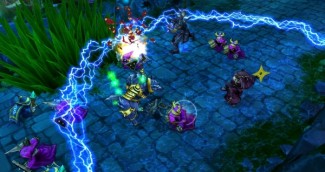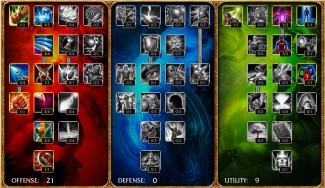Bastion
LQ: 9.15
Recommended Age: 10+
Skills Used: Planning, Working Memory, Mathematics, Reading
League of Legends is a free to play game of the Multiplayer Online Battle Arena (MOBA) genre. This immensely popular and competitive online game pits two teams of players against one another for control of a map. Players select champion characters with vastly varied abilities and team up to defeat a group of other players. Outside of battle, players will work on leveling up a “Summoner“ page with different “masteries” for their favorite champions, and manage a game currency which can be used to unlock new champions and runes that can power up your champs. The thinking skills exercised in League of Legends makes the game an ideal positive psychology tool. The game is played online, so parents should be aware of the interactions their child has with other players. Due to moderate fantasy violence, blood-like visuals, online interactions and the complex nature of the game, League of Legends is recommended only to kids 14 and older.
Developing a systematic approach for setting, and achieving goals.
 League of Legends is a game with an immense amount of depth. To be successful the player will have to have a strong understanding of the game's fundamental principals and build a well-planned champion. League of Legends requires the gamer to choose a champion character for each match and "level-up" that champ's abilities by playing the game. To make a viable champion, he will need to have an understanding of what makes his character unique and how best to play to that champion's strengths. This means maximizing a champion's abilities by creating custom mastery pages and planning what items his character will buy in-game. By planning how to best coordinate his champ's abilities, the player can inflict maximum damage, as well as strategize with teammates for increased overall effectiveness.
League of Legends is a game with an immense amount of depth. To be successful the player will have to have a strong understanding of the game's fundamental principals and build a well-planned champion. League of Legends requires the gamer to choose a champion character for each match and "level-up" that champ's abilities by playing the game. To make a viable champion, he will need to have an understanding of what makes his character unique and how best to play to that champion's strengths. This means maximizing a champion's abilities by creating custom mastery pages and planning what items his character will buy in-game. By planning how to best coordinate his champ's abilities, the player can inflict maximum damage, as well as strategize with teammates for increased overall effectiveness.
Adapting and adjusting to changing conditions and expectations.
League of Legends is a game where the conditions of the battlefield are always changing, making cognitive reframing integral to success. To be competitive, the players need to have flexible playing styles and adapt when the momentum of a match begins to shift. If a teammate is killed and sent back to the spawn point, a player will have to coordinate with other team members on how best to pick up the slack and maintain control of the given area of the map the fallen teammate was defending. If an enemy champion seems to be getting too powerful and is giving a player a thrashing, it will be necessary to adapt and buy an item in order to provide extra armor. Much like in strategic games such as chess or football, changing your gameplay to counter your opponent's move is critical to success. Practicing this kind of flexibility can build resilience and self-esteem.
Understanding our own actions, thoughts, and feelings. Improving social skills.
 League of Legends is a game that requires strong teamwork in order to succeed. The player must be aware of his role on the battlefield, as well as how to best work together with his team. Fellow players will become disgruntled if a player continually charges off on his own or leaves the computer in the heat of battle. The social aspects of the game dictate that players must be aware of their comments and actions, and disruptive players may be reported to the game's community policing function known as "The Tribunal." Egregious offenders of the game's etiquette will be judged by a panel of experienced players and penalties ranging from account suspension, to account deletion can be handed down. But being a good community member and helping others will practice gratitude and empathy and give a player a sense of purpose.
League of Legends is a game that requires strong teamwork in order to succeed. The player must be aware of his role on the battlefield, as well as how to best work together with his team. Fellow players will become disgruntled if a player continually charges off on his own or leaves the computer in the heat of battle. The social aspects of the game dictate that players must be aware of their comments and actions, and disruptive players may be reported to the game's community policing function known as "The Tribunal." Egregious offenders of the game's etiquette will be judged by a panel of experienced players and penalties ranging from account suspension, to account deletion can be handed down. But being a good community member and helping others will practice gratitude and empathy and give a player a sense of purpose.
Use this Play Together guide to learn how you can help your child turn League of Legends play time into a positive learning and relationship-building experience. To learn more about why playing games with your children is so important, check out our Science of Play page.
Take a minute to talk with your child about how the Planning, Flexibility, and Self-Awareness thinking skills work, and why they are important for success in school and at home.
League of Legends is a multiplayer game that you can play with your children. However you will need two PC's and two (free) game accounts. Even if you don't plan on playing LofL with your kids, there are still several gameplay goals you can help your children complete, ensuring they get the most from their experience.
Gameplay Goals:
After you've played a match or two against the game's AI, stop and ask your child how the Planning and Flexibility thinking skills helped improve his play and how those skills will be an asset as he progresses through the game.
For more information related to League of Legends, check out the MobaFire website. Here you'll find forums, champion build guides, and strategies to make you a more effective League of Legends player!
Our Make it Work activities are designed to transform your child’s gameplay into real-world improvements in thinking and academic skills. If you’re just getting started with LearningWorks for Kids, we suggest you try them all to determine activities are best for you and your child.
Read over the pages for Planning, Flexibility, and Self-Awareness. Then take some time to introduce these thinking skills to your child.
Explain that:
Brainstorm. Encourage children to brainstorm and write down possible steps for planning a school project, a birthday party, or holiday shopping. Brainstorming basics include sharing ideas, accepting responses without judgment, and taking risks. Reflect upon how one person’s ideas may encourage new ideas from others, and how brainstorming can produce creative solutions. Keep a binder of successful plans for future reference.
Learning by trial and error is a key component of video gaming and is a necessary skill for all of your child’s academic pursuits. In real-world situations, children are often more reluctant to learn the directions and expectations of a task by making mistakes and trying out something new than they would be in playing a game. Learning how to cook a favorite meal, learning a new musical instrument, or taking a new route to school are all valuable examples of ways to practice applying trial and error learning in appropriate situations. Make sure to talk about these efforts and experiences in light of the positive and negative aspects of the process.
Be a reporter. Make use of occasional opportunities for you and your child to sit back and observe other children in small groups. On a bench at the playground, at the beach, or at the mall take turns reporting on social interactions you can watch live. Make guesses about what might be going on and then point out any physical actions, facial expressions, behaviors, or tones of voice that give clues to support or disprove your imagined story.
All membership plans come with full access to our entire suite of tools learning guides, and resources. Here are a few of the ones we think you’ll like the most: